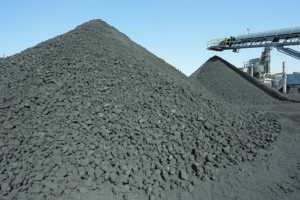
With the second most petroleum refineries in the United States, Louisiana is responsible for many raw materials and end-products that we rely on every day. There’s one by-product of the refining process, however, that the industry would rather not deal with: petroleum coke.
While petcoke is a nuisance to refiners, there is a company with a big presence in Louisiana – including Norco – that transforms this carbon-rich raw material into essential ingredients for a wide range of industrial processes and manufactured products.
 Rain Carbon Inc. operates four calcining plants in Louisiana – Chalmette, Gramercy, Lake Charles and its facility at 801 Prospect Ave. adjacent to Shell Norco – where the petcoke is processed through high-temperature kilns to increase its density and electrical conductivity properties. Once processed, the “calcined” petroleum coke becomes a key raw material in the production of carbon anodes used during the electrolytic process to produce primary aluminum. It’s also a raw material used to produce titanium dioxide, which becomes a pigment in paints for construction and automotive applications, and a filler in plastics, coatings, cosmetics, toothpaste, and sunscreen.
Rain Carbon Inc. operates four calcining plants in Louisiana – Chalmette, Gramercy, Lake Charles and its facility at 801 Prospect Ave. adjacent to Shell Norco – where the petcoke is processed through high-temperature kilns to increase its density and electrical conductivity properties. Once processed, the “calcined” petroleum coke becomes a key raw material in the production of carbon anodes used during the electrolytic process to produce primary aluminum. It’s also a raw material used to produce titanium dioxide, which becomes a pigment in paints for construction and automotive applications, and a filler in plastics, coatings, cosmetics, toothpaste, and sunscreen.
At the Norco plant, which began operation in 1965, Rain Carbon produces approximately 230,000 tons of calcined petroleum coke per year – with much of the feedstock coming from its Shell Norco neighbor.
“In addition to creating the raw materials for many products that make 21st-century life possible, Rain Carbon’s ability to extract additional value from industrial by-products rather than letting them go to waste is a great environmental story,” said Alan Chapple, director of corporate communications and public relations for the Connecticut-based company. “We’re not just recycling – we’re ‘upcycling.’”
Another industrial by-product that Rain Carbon utilizes is coal tar. At its distillation facilities in Europe and Canada, this global carbon and advanced materials company is transforming coal tar into dozens of raw materials used in adhesives, rubber goods like tires, and construction products such as concrete and gypsum. With an eye to the future, Rain Carbon has developed new coal tar-based products designed to meet evolving societal and regulatory requirements, such as the coatings that give lithium-ion batteries their long life and eco-friendly resins for cleaner, safer food packaging and sanitary products.
The distillation facilities also produce coal tar pitch – another key ingredient in the carbon anodes used in aluminum production, acting as a binder for the calcined petroleum coke in the anodes.
“Without calcined petroleum coke and coal tar pitch – Rain Carbon’s two core materials – you wouldn’t have aluminum and the many products that benefit from the lightweight, high-strength, corrosion-resistant and electric-conductive properties of this versatile metal,” said Ron Garbarino, a co-leader of Rain Carbon’s global strategy group in Covington.
The company’s impact goes far beyond making countless products in our lives possible. Here in Louisiana, the 225 employees at its four plants and business office in Covington are actively involved in the local community.
“One of our building blocks for success – which support our company values – is community involvement,” said Derek Taylor, Norco plant manager.
At the Norco plant, Taylor said, community involvement includes employee efforts to raise money for United Way of St. Charles during the annual Battle for the Paddle cook-off and purchasing “secret Santa” gifts for students at Luling Elementary.
“Across the state – and on the three continents where we have facilities — Rain Carbon and our employees are committed to enhancing the quality of life in the communities where we live and work,” Taylor added. “We demonstrate that through the contributions of our foundations in Germany and India to schools and hospitals, the sweat equity of our Louisiana employees on volunteer projects for the United Way, Habitat for Humanity and local food banks, and through our company’s commitment to environmental stewardship while producing raw materials for so many products that we depend on every day of our lives.”
Learn more about Rain Carbon online at www.raincarbon.com.

Be the first to comment